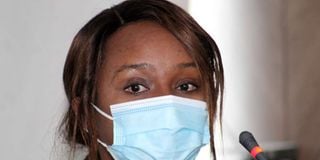About 500,000 teens accessed tele-health services last year

Health Chief Administrative Secretary Dr. Mercy Mwangangi during the inauguration of the RMNCAH-N multi stakeholder country platform at a Nairobi on January 14, 2021. She says the ministry has ramped up continuity of reproductive and maternal healthcare services through technology.
What you need to know:
- About 500,000 adolescents have accessed health services in the past one year.
- Through technology, the ministry has ramped up continuity of reproductive and maternal healthcare services.
- Employing innovation and technology to ensure adolescents and youth access quality health services, attaining zero maternal and new-born mortality as well as universal basic education are among the commitments the government made during the 25th anniversary of ICPD.
About 500,000 adolescents have accessed health services in the past one year since the country committed to expanding provision of sexual and reproductive health care to women and girls.
Health Chief Administrative Secretary Dr. Mercy Mwangangi attributes this achievement to the ministry’s adoption of tele-health in offering reproductive and maternal healthcare services amidst Covid-19 pandemic.
“Through technology, the ministry has ramped up continuity of reproductive and maternal healthcare services,” she said on Wednesday, in Nairobi, during the launch of a report on progress of implementation of 17 commitments Kenya made during the November, 2019 Nairobi Summit.
As at June 2020, the number of mobile subscriptions stood at 57 million, provides data from Communications Authority of Kenya (CAK), a penetration that various studies indicate boosts delivery of services.
Employing innovation and technology to ensure adolescents and youth access quality health services, attaining zero maternal and new-born mortality as well as universal basic education are among the commitments the government made during the 25th anniversary of the International Conference on Population and Development (ICPD) Programme of Action.
Blamed Covid-19
Kenya is still lagging behind in reducing the maternal deaths from 362 to at least 115 per 100,000 live births despite the notable efforts being made, decried the CAS.
She blamed the outbreak of Covid-19 for a dragged progress in attaining the commitments, an effect replicated globally.
On the education front, Principal Secretary for Education Dr Belio Kipsang’ said the ministry’s re-entry policy for teen mothers and pregnant adolescents contributes to attaining universal access to education as it ensures no girl is left behind.
The policy, he said, “goes a long way in contributing to a 100 per cent completion and retention in schools.”
He noted that in the 2019/20 period, the ministry recorded a 100 per cent transition from primary to secondary, an increase from 95 per cent in the year, 2018/19.
Dr Kipsang’ said provision of sanitary towels to 1.6 million girls and continued sensitisation of nomadic communities on ending harmful cultural practices that keep girls off school, are all part of the measures taken to maintain a 100 per cent completion and retention in schools.
Family planning
“We have been able to maintain an 82 per cent completion rate in primary schools. We are also at 103 per cent, in secondary schools,” he said
Acting UN Resident Coordinator Dr. Medhin Tsehaiu said the UN would continue to support Kenya maintain efficient delivery of health services.
“In collaboration with the Ministry of Health, UNFPA has continued to provide Family Planning commodities to eliminate the unmet need for family planning as well as support on the provision of maternal health services that are key in eliminating preventable deaths,” she said.
Recent data from Family Planning 2020 (FP2020) indicate that in 2020, more than 5.9 million women were using a modern method of contraception.
As a result, more than 2.2 million unintended pregnancies were prevented. Further 503,000 unsafe abortions and 5,700 maternal deaths were averted.





